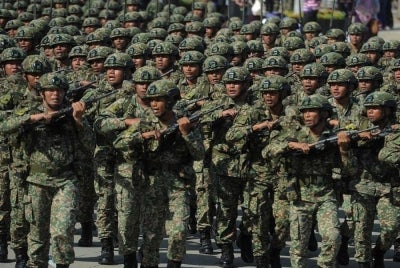The evolution of money laundering, staying one step ahead
MOHAMAD ZAMRI ZAINUL ABIDIN
Combating financial crime and money laundering is a cornerstone of a broader agenda to fight organised and serious crime by depriving criminals of their ill-gotten gains.
Apart from prosecuting those who assist in the laundering of such proceeds, a number of strategies can be employed to recover the stolen assets, simultaneously paralysing the operations which benefitted from ill-gotten gains.
The Malaysian Anti-Corruption Commission (MACC) is empowered to enforce recovery of stolen assets via the Anti-Money Laundering and Anti-Terrorism Financing Act 2001 (AMLATFPUAA 2001).
This act aims to establish provisions concerning the criminal act of money laundering, the strategies to be implemented to prevent money laundering and terrorism financing offenses. It also addresses the seizure of assets linked to or obtained through money laundering, along with properties associated with acts of terrorism, gains from illegal activities, and tools used in committing those offenses.
In recent years, recovery of laundered money has become increasingly more challenging due to the evolving modus operandi of criminals by operating in syndicates and laundering their ill-gotten gains through legally registered companies with proxies and nominees as fronts to hide their wealth.
Oftentimes, it is done through seemingly legitimate financial transactions while the ill-gotten gains are then spent or used for legal or illegal purposes to generate more income. It can also be donated to charities, or made as payment for legitimate services rendered or for political funding purposes. The complexity and fluidity of money laundering makes asset recovery all the more complex and challenging.
Furthermore, investigators are challenged by the emerging threat of the usage of virtual assets and cross border transactions involving offshore entities in multiple jurisdictions. Acts of corruption and fraud could be hidden via various layers of record and documentation, while conversion of the illegal money could be carried out through new mediums such as cryptocurrencies, underground trading, cross-border financial institutions as well as offshore financial services.
Returning Wealth to the People
Paramount to the Anti-Money Laundering Act, AMLATFPUAA 2001, is the recovery of assets to be returned to the government for development budgets such as building of schools, hospitals and infrastructure to benefit the people.
It is quite different in spirit from the Penal Code which is to charge and mete out harsh punishments to deter would-be criminals. While that element is also just as important in the AMLATFPUAA 2001, it takes a more practical route from the understanding that if you recover the stolen assets, you paralyse the operations which benefitted from ill-gotten gains. Furthermore, relying just on prosecuting the suspects may take long years in court which may or may not end in the conviction of the wrongdoers.
Strategies to Recover Assets and Fight Corruption
The MACC employs three strategies. Firstly, we focus on investigating high-profile, public interest, and sensitive corruption cases. Secondly, we aim to curb leaks and save government funds and revenue. Thirdly, we work towards curbing corruption among frontlines. This strategic focus underscores our dedication to combating corruption at its most pervasive and damaging levels.
One of the key strategies employed by MACC is the thorough scrutiny of assets and wealth declarations, which inadvertently create a more transparent environment that discourages corrupt practices. This strategy not only acts as a deterrent but also provides a basis for investigating any unexplained wealth, thereby facilitating the identification of ill-gotten gains.
Furthermore, MACC's investigative approach is informed by intelligence analysis and data-driven techniques. One of the main sources of data is from the reporting institutions, as compiled under the Anti-Money Laundering Act. This enables us to delve deeper into complex cases, uncover hidden connections, and expose intricate webs of corruption. By leveraging advanced tools and methodologies, we can efficiently gather evidence and build strong cases against those involved in corrupt activities.
Illustrating our commitment are operations to paralyze criminal syndicates like "Ops Tropicana," "Ops Hire," "Ops Hacks," and "Ops Jaguar." These efforts not only reinforce Malaysia's commitment to combating corruption on a global scale but also enhance the country's reputation as an active participant in international anti-corruption initiatives.
The 1MDB Challenge
Malaysia has garnered both bouquets and brickbats for being in the centre of what has been called one of the world’s greatest financial scandals. Despite the huge challenge to prosecute and recover assets linked to the 1MDB sovereign wealth fund, I am proud to say that the MACC has managed to achieve about 62 per cent of asset recovery, or RM28.93 billion, with the establishment of the International Task Force on 1MDB asset recovery and prosecution. This in comparison to the global success rate of recovering stolen assets of only 30 per cent.
Members of the international task force include Malaysia, the United States, France, Singapore, Switzerland and Luxembourg. This task force coordinates asset recovery efforts, sharing of information and evidence, discusses the appropriate and best strategy to address 1MDB internationally, and develops new leads relating to the case.
MACC’s strategies are also aligned with international standards and policies set forth by key organizations, ensuring a commitment to maintain global financial integrity and combat illicit activities.
Specifically, we adhere to the guidelines established by the Financial Action Task Force (FATF), an influential intergovernmental body that develops and promotes measures to prevent money laundering, terrorist financing, and other threats to the international financial system.
Furthermore, our practices are in accordance with the recommendations and initiatives presented by the United Nations Office on Drugs and Crime (UNODC), focusing on countering organised crime and fostering international cooperation, as well as adhering to the principles outlined in the United Nations Convention Against Corruption (UNCAC).
By aligning our strategies with these international instruments, we contribute to a more secure and stable global financial landscape while actively addressing emerging challenges.
Gaining International Recognition
Recognised internationally for our successes in investigating money laundering, the MACC was invited to participate and share its experiences at the Asia Pacific Group On Money Laundering (APG) Annual Meeting And Technical Assistance & Training Forum in Vancouver last July (July 9, 2023).
The APG is an inter-governmental organization that focuses on combating money laundering and terrorist financing. Its annual meetings provide a platform for member countries to collaborate, share insights, and discuss strategies to address these financial crimes effectively.
The MACC was also invited to give the Keynote presentation at the International Seminar on Enhancing Capacity to Recover Stolen Assets in Southeast Asia in Bangkok in May and the Anti-Corruption Collective Action Roundtable (AC-CA Malaysia) organized by UN Global Compact Network Malaysia & Brunei in March this year.
In conclusion, the Commission's unwavering focus on uncovering grand corruption underscores its strategies such as intelligence analysis, identification of Ultimate Beneficial Ownership (UBO), parallel investigation with money laundering, and awareness of the latest methodologies – be it investment in high-value paintings, wines, artefacts or usage of cryptocurrencies in money laundering crimes. This underlies MACC’s commitment to stay one step ahead of money laundering crimes in order to uphold the integrity of public and private institutions and fostering a fair and accountable society for all.
Datuk Mohamad Zamri Zainul Abidin is the Anti-Money Laundering Division Director at Malaysian Anti-Corruption Commission (MACC).
The views expressed in this article are the author's own and do not necessarily reflect those of Sinar Daily.
Download Sinar Daily application.Click Here!














